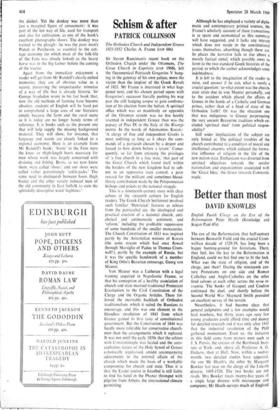The Orthodox Church and Independent Greece 1821-1852 Charles A. Frazee
(cue 60s)
Schism & after
PATRICK COLLINSON
Sir Steven Runciman's recent book on. the Orthodox Church under the Ottomans, The Great Church in Captivity (cue 1968), left the Oecumenical Patriarch Gregorios V hang- ing in the gateway of his own palace, more the victim than the inspirer of the Greek Revolt of 1821. Mr Frazee is interested in what hap-
pened next, and his chosen period opens with Gregorios's successor literally pushing his way past the still hanging corpse to gain confirma- tion of his election from the Sultan. A spiritual office which was so manifestly an appendix of the Ottoman system was no less keenly resented in independent Greece than was the papacy of Pius IX in the Italy of the Risorgi- mento. In the words of Adamantios Korais: 'A clergy of free and independent Greeks is most unfitting as long as it obeys the com- mands of a patriarch chosen 'by a despot and forced to bow down before a tyrant.' Conse- quently, so far from enjoying the privileges of 'a free church in a free state,' that part of the Great Church which found itself within the borders of the new kingdom had to sub- mit to an oppressive state control, a poor reward for the militant and sometimes blood- thirsty contribution made by the Peloponnesian bishops and priests to the national struggle.
This is a nineteenth century story with clear echoes of the sixteenth century for English readers. The Greek Church Settlement involved such familiar 'Henrician' features as schism from the patriarchal see, the ideological and practical erection of a national church, anti- clerical and antimonastic sentiment, and 'reform,' including the profitable suppression of some hundreds of the smaller monasteries.
The Church Constitution of 1833 was inspired partly by the Aristotelian notions of Korais (the same stream which had once flowed through Marsiglio of Padua to Thomas Crom- well!), partly by the example of Russia, but it was the specific handiwork of a member of King Otho's Bavarian entourage, Georg von Maurer.
Von Maurer was a Lutheran with a legal training acquired in Napoleonic France, so that his conception of a healthy association of church and state married traditional Protestant Erastianism to the Civil Constitution of the Clergy and the Organic Articles. There fol- lowed the inevitable backlash of Orthodox traditionalism, which it suited the Russians to encourage, and this was one element in the bloodless revolution of 1843 from which Greece gained its first taste of constitutional government. But the Constitution of 1844 was hardly more tolerable for conservative church- men than the arrangements which it replaced.
It was not until the early 1850s that schism with Constantinople was healed and the auto- cephalous nature of the Holy Synod of Greece canonically regularised, amidst accompanying adjustments to the internal affairs of the church which made the basis of a workable compromise for church and state. Thus it is that the Easter tourist in Istanbul is still liable to find his hotel in the Phanar thronged with pilgrims from Athens, the international climate permitting.
Although he has employed a variety of diplo- matic and contemporary printed sources, Mr Frazee's scholarly account of these transactions is as spare and economical as this summary will have suggested, and it lacks any interest which does not reside in the constitutional issues themselves, absorbing though these are. In places the narrative fails to rise above a merely factual annal, which possibly owes its form to the two standard Greek histories of the period, to which the author acknowledges some indebtedness.
It is left to the imagination of the reader to raise, and answer if he can, what is surely a crucial question: to what extent was the church- state crisis due to von Maurer personalty, and to the accident which placed the affairs of Greece in the hands of a Catholic and German prince, rather than of a head of state of the -Orthodox faith? Or was the situation one that was indigenous to Greece perpetuating the very ancient Byzantine tradition which ex. eluded 'spiritual men' from political respon-
sibility? • Still wider implications of the subject are only hinted at. The political troubles of the church contributed to a condition of moral and intellectual anaemia which reduced the forma- tive influence of religion in the life of the new nation state. Enthusiasm was diverted from spiritual objectives towards the secular nationalism and expansionism associated with the 'Great Idea,' the thrust towards Constanti nople.


































 Previous page
Previous page